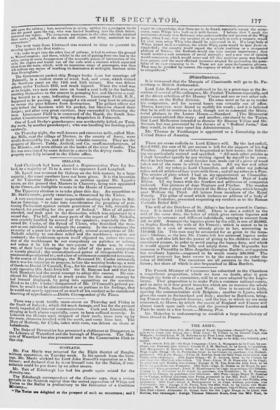IRELAND.
Lord Cletihrork had been elected a Representative Peer for Ire- land, by a majority of 75 to 4, over his opponent Lord Langford.
Mr. Lynch was returned for Galway on the 16th instant, by a large majority ; the exact numbers have not been given. It is the intention of Sir Valentine Blake's friends to petition against Mr. Lynch's return, on the ground that Masters in Chancery, being now appointed by the Crown, ure ineligible to seats in the House of Commons.
The Tipperary election is to take place this day. An opposition to Mr. Shell's return, purely vexatious, is threatened by the Tories.
A very numerous and most respectable meeting took place in Bel- fast on Saturday, " to Luke into consideration the propriety of peti- tioning Parliament against certain provisions of the bill, recently in- troduced, for providing for the poor of Ireland." Men of all parties attended, and took part in the discussion, which was adjourned to a second day. The bill, and many pelts of the report of Mr. Nicholls, were severely handled by several of the speakers; especially the Re- verend Dr. Cooke, of the Synod of Ulster, who described the mea- sure as one calculated to strangle the country. In the resolutions the necessity of a poor-law is acknowledged; several assumptions of Mr. Nicholls relating to out-door relief and the workhouse system are combated ; the workhouse system itself objected to, unless the erec- tion of the workhouses be not compulsory on parishes or unions, snd unless it he left to the rate-payers to make use, in every Way, of their local knowlege for the relief of the poor ; emigration 13 warmly pleaded ; the unconstitutional power of irresponsible Coin- musionersh ips objected to ; and a law of settlement considered necessary. In the course of the proceedings, the Reverend Dr. Cooke intimated, that it was his intention to propose, before the meeting broke up, a vote of thanks to Daniel O'Connell, Esq., for his moral courage in so strenu- ously opposing this Anti.Irish bill. Sir R. Bateson had said that few Irish Members had the moral courage to adopt this course. He con- sidered Sir Robert entitled to much praise for the moral courage he had himseif displayed, by going into opposition on the question. Much as 1w (Dr. Cooke) disapproved of Mr. O'Connell's general po- litics, he would not be characterized as so partisan in his feelings, that be would not openly approve of so much of his conduct as he considered deserving of approbation.—Dublin Correspondent of the Times.


























 Previous page
Previous page